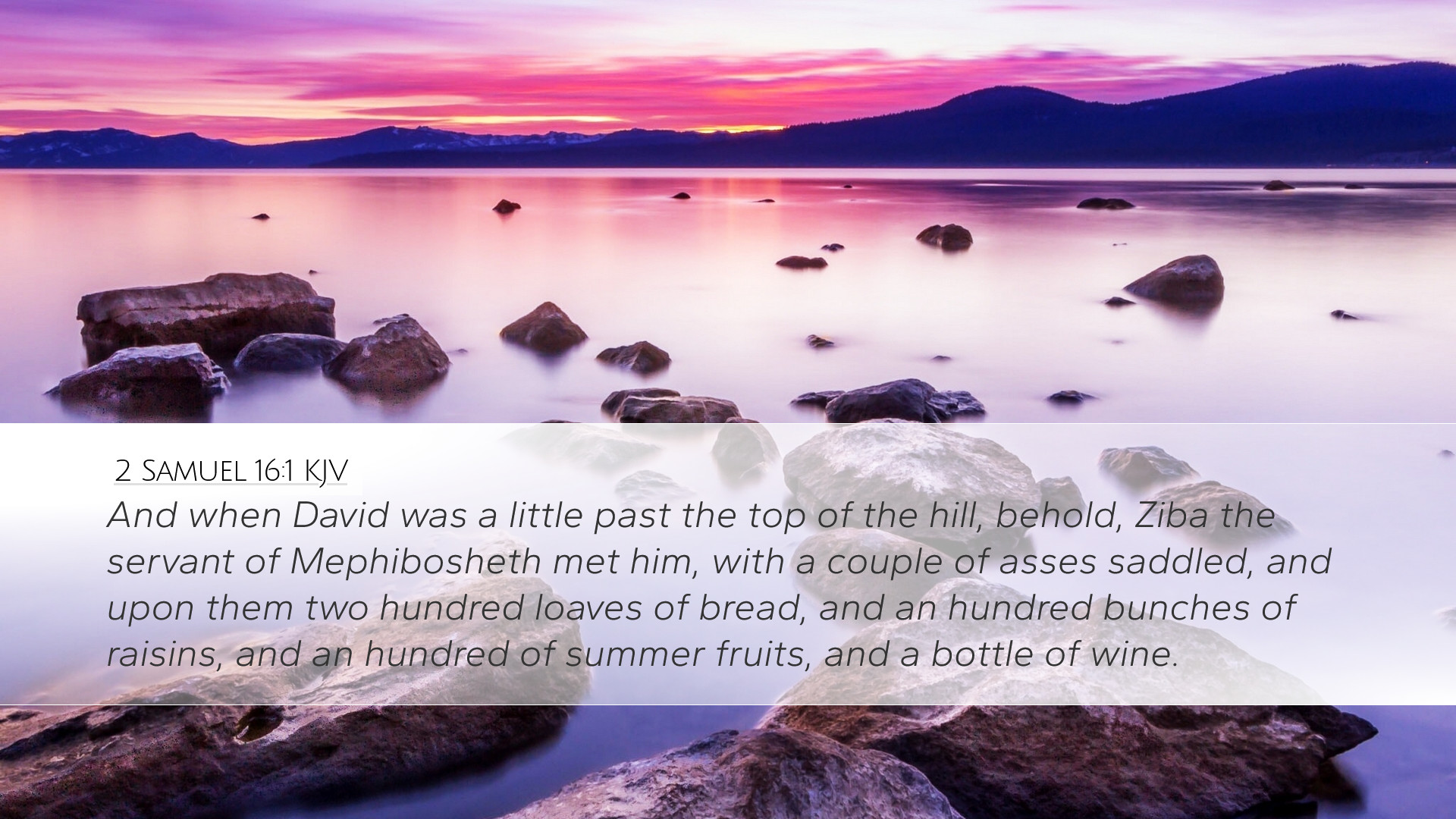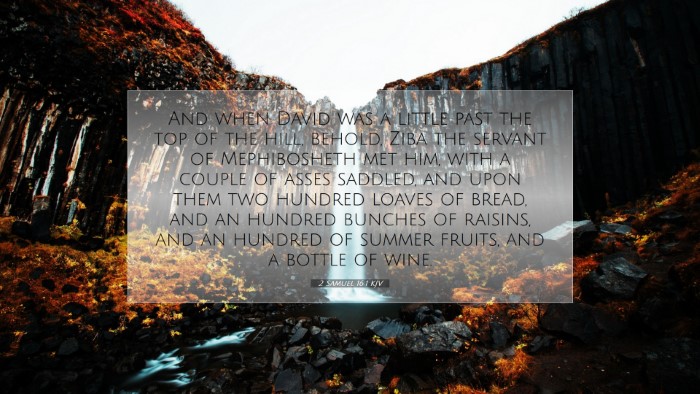Commentary on 2 Samuel 16:1
The verse 2 Samuel 16:1 states: "And when David was a little past the top of the hill, behold, Ziba the servant of Mephibosheth met him, with a couple of asses saddled, and upon them two hundred loaves of bread, and a hundred bunches of raisins, and a hundred of summer fruits, and a bottle of wine."
Contextual Background
To truly appreciate this passage, it is essential to understand its broader context. David is in a period of turmoil, fleeing Jerusalem due to Absalom's rebellion. This narrative is filled with themes of loyalty, betrayal, and divine providence, making it significant for clergy and scholars alike.
The Character of Ziba
Ziba, the servant of Mephibosheth, appears at a critical moment with provisions for David. His presence and actions provide a rich area for theological reflection. According to Matthew Henry, Ziba represents a complex character with duplicity, as he takes the opportunity to serve David while casting doubt on Mephibosheth's loyalty.
-
Matthew Henry's Commentary: Describes Ziba as a man who appears to champion David’s cause while framing Mephibosheth as a traitor. This act of bringing sustenance during David's flight illustrates both Ziba’s opportunism and the precarious nature of loyalty in times of strife.
-
Albert Barnes: Offers insight into the provisions Ziba brings, emphasizing its symbolic representation of kindness at a time of desperation, thus categorizing Ziba’s actions as potentially noble but ultimately self-serving.
-
Adam Clarke: Focuses on the physical nature of the gifts, interpreting them as signs of support and solidarity, reflecting an engagement in the tumultuous civil strife that characterized this era in Israel.
The Significance of David's Condition
David finds himself in a vulnerable position, accentuated by his physical journey. The phrase "when David was a little past the top of the hill" symbolizes a transitional moment, both physically and spiritually.
-
Matthew Henry comments on David's state of vulnerability: "There’s something touching in David’s condition, suggesting that even the mightiest of kings have their low moments."
-
Albert Barnes highlights the metaphorical importance of 'the top of the hill', suggesting it signifies a pinnacle of confrontation with his own sense of kingship and reign, emphasizing that the journey of leadership is fraught with challenges.
Understanding Loyalty and Betrayal
The interaction between Ziba and David raises profound questions regarding loyalty and betrayal. David must navigate the conflicting narratives surrounding Mephibosheth, interpreting his loyalty to his friend amidst accusations.
-
Adam Clarke notes this moment serves as a reminder of how perceptions can be skewed, urging readers to consider how narratives about loyalty and treachery can often be manipulated for personal gain.
-
Albert Barnes warns against taking appearances at face value, framing this episode as a cautionary tale about assumptions regarding allegiance during times of upheaval.
Theological Implications
This verse provides rich material for theological reflection. The actions of Ziba and David call to mind themes of grace, provision during hardship, and the complexity of human relations under divine sovereignty.
-
Matthew Henry emphasizes the importance of grace: "Even in David’s failure and his flight, God provides for those who seek Him, illustrating that divine providence is often at work even in our trials."
-
Adam Clarke indicates that the provisions mentioned not only meet physical needs but also serve as reminders of God’s care. He suggests that David's journey reflects a reliance on God amid uncertainty.
Conclusion: A Reflection for Today
The encounter described in 2 Samuel 16:1 represents more than just a moment in the narrative; it is a poignant reminder of the complexities of loyalty, the reality of human struggle, and the continuous need for divine provision. David’s flight from Jerusalem resonates with the challenges faced by modern believers—facing betrayal, needing sustenance, and grappling with their faith amidst turmoil.
For pastors, this passage provides a basis for exploring the dynamics of trust among congregants, the evaluation of loyalties, and the assurance that God remains faithful even when human beings misstep. For scholars, it serves as a profound exploration of the themes of justice, mercy, and the human condition.


